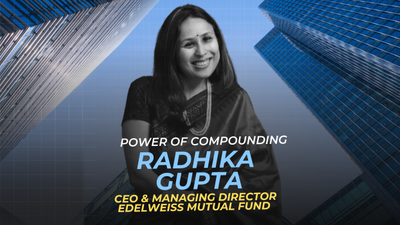“There is a poor definition in the jewellery business of what is the customer's lifecycle. A kid’s life cycle is also unique. We went to Cartoon Network and tied up with Peppa Pig and made that our brand. Today, we do close to 80 crores of Peppa Pig in a year.”
They say that diamonds are forever.
But what they don’t say is that getting those diamonds to discerning Indian consumers through online stores can take close to forever, too. Unless you are Mithun Sacheti, who made his life’s mission to get Indians to buy diamonds online.
Mithun Sacheti is the co-founder and former CEO of CaratLane, a Titan company that recently clocked 2,177 crore INR in revenue. The power of compounding was at its full display, as Titan first invested in CaratLane in 2016, which was valued at 575 crores INR post-money, and then bought out Mithun’s remaining 27% stake in August 2023, valuing CaratLane at a sweet 17,000 crores INR.
Filled with rich anecdotes, insights, and learning, Mithun’s journey is one that shines, surprises, and, most importantly, teaches some well-earned secrets from the battlefield of entrepreneurship.
The Early Days
In the glittering world of jewellery, Mithun's journey is a tale of sweat and grit.
Hailing from a family deeply entrenched in the gemstone business, Mithun's early exposure to the craft of jewellery, guided by his hardworking mother and financially astute father, set the stage for his entrepreneurial foray.
Jaipur Gems, a thriving family business, served as his training ground, imparting crucial lessons in design, manufacturing, and the intricate dance of cash flow.
Mithun: “Mom was extremely hardworking. She was the dominant force behind the business. There were people who would work on design with her and would be working from home many times as well on weekends. When I finished the last couple of years of college, I was really stressed out because I felt that there is no way I can compete with the effort my mom puts in at work. It's almost impossible.”
However, the legacy store designed for the matriarchs of families felt incongruent with the dynamic shift he envisioned for the future of jewellery.
Mithun: “Jaipur Gems, like all other jewellery stores, was designed for the mother, not for the daughter. The mothers would bring the daughter in, and we were never a destination where the daughter brought the mother. So we had to rethink ourselves entirely, in a new avatar, and try to create that.”
The decision to break away from the family legacy wasn't an act of abandonment; it was an audacious step into uncharted territory, guided by the belief that the future of jewellery lay beyond the familiar confines of the past.
CaratLane, founded in 2008, with its tech-enabled, design-centric approach, was Mithun's response to the changing rhythm of the industry. For him, it wasn't just about crafting jewellery; it was about crafting an experience for a new generation, one that defied the conventional norms of the jewellery market.
When the online jewellery realm was still finding its rhythm, Mithun faced the stark reality of being ahead of the curve. But with the daunting challenge of staying power and the perpetual hunger for capital, Mithun navigated through the initial storms. The family's 74 lakhs and Srinivasa Gopal's (more on him later) 26 lakhs were mere drops in the vast ocean of potential, and the need for capital became a relentless undertow.
Advisers cautioned against selling jewellery online, echoing a chorus that the category wasn't cut out for the digital realm.
The turning point arrived with the flick of a switch—the website going live. Months of silence were broken by the sound of the first transaction, a momentous victory in a landscape where conversion rates were a mere whisper.
But, the hurdles didn't end there; infrastructure challenges loomed large, from literally creating payment gateways for high-value transactions to convincing couriers that jewellery was worth their route.
Mithun: “We got our first transaction from Japan, but the nightmare really was to fulfil the transaction. One of the hardest moments is when the government comes to your door. And they really make your life difficult because there was a FDI regulation change in e-commerce. FDI in e-commerce was not allowed and we had already raised money.”
Whoever said starting an e-commerce business is easy perhaps hasn’t had to deal with one of the most precious objects in the world.
Eye of the Tiger
CaratLane soon caught the eye of Lee Fixel, leading investments in India at Tiger Global, who ended up cold mailing Mithun. Across four tranches, Tiger Global invested more than $50 million in CaratLane.
But the Tiger deal itself had an almost chuckle-worthy beginning.
Mithun: “We went to the US just to meet Lee because there was no website for Tiger Global Management. This man has reached out to us through LinkedIn, and we had never even heard of him before. So we said, let's just go touch base and come back!”
Mithun believed in ‘reverse diligence’ before it became cool.
Tiger stayed invested in the business for five years, from 2011-2016, before selling their stake to Titan.
The Believers
The Titan deal, a beacon of CaratLane’s aspirations, crumbled minutes before its grand announcement.
Mithun: “I announced the deal to my 400-member strong team, and we were all celebrating. It was our seven-year anniversary and a major milestone for the employees and investors.”
A deal that encapsulated six months of dreams was shattered, leaving Mithun and his team in a state of shock. The day that began with celebrations ended in despair.
Mithun: “We got a call at 3:28 saying that, sorry… it's not going through, a certain member in the board has not agreed to it”
Enter Subbu, the unsung hero of this entrepreneurial saga. The CFO of Titan, grappling with the same heartbreak, orchestrated a revival. A conversation between Mithun and Subbu breathed life back into the deal that fate momentarily snatched away. Bhaskar Bhatt, the matchmaker and Managing Director of Titan, facilitated the resurrection.
Through highs and lows, Mithun emerged not just as an entrepreneur but as a master orchestrator, turning naysayers into believers.
It’s important that we talk about Srinivasa Gopalan aka Gopal, the wizard behind SIFY's Nasdaq stint, who was
Gopal, a client during the Jaipur Gems era, was initially sceptical of Mithun's tech dreams. His persistent pitch about online diamond transactions tested even the most patient of listeners. Then came the tipping point—a friend from the US sealed a 60,000 INR diamond deal without laying eyes on the precious stone. That "aha" moment set the stage for a partnership that defied norms.
The mentorship and organizational wisdom Gopal brought were immeasurable. Despite the stark contrast in their backgrounds, Mithun found an unwavering ally. Every Tuesday, Gopal, the seasoned chairman, took time to sip coffee and share insights.
Their chemistry was an anomaly—a jeweller and a tech maestro—with a 20-year age gap-but it worked. Gopal, the angel investor and mentor, went beyond those titles. He became an integral part of CaratLane's DNA, shaping its trajectory.
It can be said that their partnership wasn't just a formal association; it was a profound connection built on trust, respect, and shared aspirations.
But he wasn’t certainly wasn’t the only inspiration.
The Big Bull
In the lively mosaic of Mithun's journey with CaratLane, the late Mr. Jhunjhunwala (RJ) emerges as an unexpected yet influential character. A man of strong opinions and unwavering beliefs, the big bull’s initial meeting with Mithun was quite the whirlwind.
After the initial conversation around gross margins was turning stale, RJ felt bored to his bone and was, quite literally, dozing off.
Then, Mithun thought of asking him for a smoke.
What was supposed to be a shared cigarette turned out to be his trump card.
RJ, now awake, listened attentively to Mithun’s thoughts on jewellery business, expansion, and categories.
A famed Titan loyalist, Jhunjhunwala questioned the loss-making aspect but acknowledged the merit of Mithun's vision.
Mithun: “And then in the end, he said, “You haven't had your cigarette?”
I said, “No, I don't smoke.”
With good reason, this moment left an indelible mark on both the parties.
Surely enough, Jhunjhunwala's scepticism transformed into mentorship. From the initial 17%, CaratLane now proudly boasts a robust 34% gross margin—a testament to the journey from scepticism to success.
Customer Lifecycles
Mithun, the architect of this venture, also shared notes on customer lifecycle management. From a child's first nazaria beads to the enchantment of Peppa Pig at the third birthday, CaratLane stays invested through milestones. The saga continues with Doraemon at the seventh birthday, navigating the intricate landscape of childhood.
What sets him apart, though, is the keen understanding that each celebration is a note in the customer's lifecycle, a share of their wallet.
CaratLane orchestrated partnerships with iconic brands like Peppa Pig and Harry Potter, making them an integral part of the customer's journey.
Yet, Mithun understood the tactile need for physical presence. He strategically planted stores, eschewing the chaotic rush to claim every city.
His first store in Delhi’s posh GK 1 area was a colossal failure though.
Mithun: “It was a disaster. We got the format wrong.”
While Mithun and Co. initially focused on doubling down on the number of stores, he soon realized that a far more important metric was to increase the number of people visiting the stores, which would lead to higher revenues.
The journey then mirrored Uber's city-capturing strategy, where they looked at each city as ‘clusters’ and gained invaluable insights into the demographics and psychographics of each area.
The richness in this data is also why Caratlane doesn’t operate a store in South Mumbai and would much rather go for the Western suburb of Lokhandwala, with the same volume of people with a similar spending capacity.
Ad Block
As the brand kept getting bigger, Mithun, navigating the intricate world of marketing, sought famed ex-McKinsey consultant Ireena Vittal's counsel on a TV campaign. This encounter became a catalyst for a strategic shift that would shape their future.
Mithun: “She said, “Do you really want to go after 140 crore or 100 crore Indians to get two lakh customers? Don't you think that's extremely inefficient?” And it made so much sense.”
Ireena's words of wisdom resonated deeply. The metaphorical dart-throwing in the dark was replaced by a sharply focused strategy. The realization dawned that greatness in business stems from thoughtful, targeted approaches, not spray-and-pray attempts.
The pivotal moment arrived around 2015, when many businesses were lured by the flashy allure of TV campaigns. Ireena's counsel echoed in Mithun's mind as he made a resolute decision – always to resist the temptation of a TV campaign without sharply defined goals.
The goal was set – a million customers transacting annually would be the threshold for considering such a move. The strategy was clear – first, build a solid foundation, then accelerate towards 10x growth.
The TATA Story
Mithun: “Two years back, I put out a dream saying that I think we have the opportunity to be the world's largest direct-to-consumer jewellery business. And India has a birthright to win in jewellery. The same way India had the birthright in software services. Because everything we cut here, everything we do here, we merchandise from here as well also. But we don't capture the gross margin here because the brand is not with us. The brand is not with us; it goes outside.”
Mithun acknowledged that his ambitious dream would have remained just that if it were not for Titan’s backing and patronage.
Mithun: “I think CaratLane's shareholding of Titan and the family was a perfect blend of the steadiness that they provided to the business and the agility that we brought in as entrepreneurs into that space. And so it grew really well
I think when it became clear to them that they don't want to do an IPO, they decided, “we better buy now than buy later.” And their logic for not doing an IPO was they don't want to have more listed entities in the group as stated by the chairman. The chairman wanted to consolidate the group as well.”
Titan gained a majority stake in CaratLane in 2016, buying out Tiger’s existing stake.
Then, as recently as 2023, they bought out Mithun’s remaining share too.
These were two starkly different companies, working on a similar product line.
Challenges were bound to happen.
Mithun: “On the ground, our life was difficult because obviously the Tanishq franchises, etc. Tanishq teams never took to Caratlane.
They were never warm to us at all and we lived with that and that's fine. Because my neighbouring jeweler also was not nice to me. So it's not something that one has to expect as well. So I was absolutely okay with that piece.
Initially you crib about it, but then you have to someday sit back and realize that, listen, I'm getting so much. Can't be cribbing about the two things I don't get.”
The Tata-CaratLane partnership is one of the books.
While there were clearly some synergies right from the start, they tided over their differences (and a no-show funding announcement) to create an entity that’s valued at more than $2 billion.
Mithun never really let go of his long-term vision, and ultimately, his belief in the power of compounding.
Mithun: “If you go to watch the McDowell Indian Derby that happens in Bombay, it's a 2,400 meter race and in the 2,400 meter race, there is a horse that is always winning the first 1,200 meters, But because that horse bolts out, he's exhausted by his 1,200. Who really wins the Derby gains the most number of lengths as he hits the 2,000 to 2,400 meter marker. That's what makes the derby exciting, and makes you want to place your bet on.”
Interestingly, and almost counter-intuitively, Mithun adopted a company structure that’s not too popular with most organisations…
The Holocracy
By now, it’s quite apparent how Mithun can be classified as someone who uses both his left brain and his right brain.
The same can be said about how he looks at company structures.
Mithun: “Wealth managers have been really after us. There are some 45 wealth managers in one particular bank who are all vice presidents reaching for one client itself. It makes no sense. So I think titles are the biggest hogwash of confusing people and trying to do this.”
He believes in a ‘holacracy,’ which, unlike a hierarchy, provides autonomy to all employees and emphasizes more on roles rather than jobs.
Fun fact: 2022 was the first year that CaratLane introduced promotions in their annual appraisal cycle.
How were things done before that, you ask?
Mithun: “Yeah, there was no concept of a promotion. Your role changes. You get more responsibility. And that more responsibility meant you got more money, but there were no titles. And whatever you come in, you write what you want. Your role was the only ask I always told everybody. So, if this is your role, then define your title as your role. It doesn't matter whether you call yourself vice president or anything else because it has very little inter-operationality between organisations. It’s best to write about the impact that you’re creating in the fewest words possible.”
Business cards: 0, LinkedIn Bios: 1.
The Road Ahead
One often looks back to look ahead.
Mithun: “If I had to rebuild again, I would do this whole ESOP piece for every single person, whatever be the quantum, but for every single sense of ownership of not just for my employees, but also for my franchises. We shortchange our franchisee partners on this part of it.”
Solving equity across the organization is only one part of the picture.
Mithun also shared the fact that he wanted to solve the fungibility aspect of jewelry without the involvement of a broker in the middle, something he had particularly faced during the start of his business journey.
Mithun: “Rakesh and I had a dream to set up a fund together. Sadly, it’ll have to stay a dream.”
Things are far from gloom and doom, as Mithun, along with his co-founders, has started work on Oro, trying to solve problems for the storage and fungibility of diamonds.
From battling large corporations, early naysayers, hardy competitors, or even employees, Mithun has had many a rough day.
But perhaps that’s what gave him his polish.
You see, diamonds are nothing but coal under pressure.
Both Mithun Sacheti and CaratLane are the true gems of the India Story.
This was an edited excerpt from the final episode of the second season of Blume’s Podcast.
You can listen to the full episode here.




